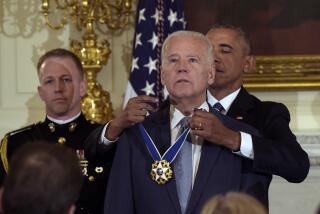Obama’s rules or Chicago rules?
- Share via
Barack Obama may soon face a defining dilemma in the wake of Illinois Gov. Rod R. Blagojevich’s alleged attempt to sell the president-elect’s Senate seat: What standard of conduct should Obama impose on aides acting on his behalf?
Here’s what we know:
It’s increasingly clear that someone on Obama’s staff talked with Blagojevich or his aides last month about the now-empty Senate seat. According to the criminal complaint filed by U.S. Atty. Patrick J. Fitzgerald, Blagojevich believed that Obama wanted his longtime aide, Valerie Jarrett, to get the seat, and the governor sought to find out what he could obtain from the president-elect in return. But after several days of discussion, Blagojevich concluded with disgust that Obama wanted to be given “his senator ... for nothing.” “[Bleep] him,” the governor added.
There’s nothing unusual about a senator or his staff talking with a governor about who will get a vacant Senate seat. That’s normal politics, even outside Chicago. So far, it seems that Obama’s team did the right thing. The question is, when the tapes and transcripts of their conversations are released, will there be something that makes us cringe?
Obama’s staff includes several people who know Blagojevich well. The president-elect’s chief of staff, Rahm Emanuel, once bragged that he was one of the governor’s most important advisors. Obama’s top political strategist, David Axelrod, worked for Blagojevich in the 1990s, although they eventually parted ways.
Axelrod said Thursday that the last time he spoke with the governor was “thankfully, a long time ago.” The normally voluble Emanuel, famous for deploying expletives as frequently as Blagojevich, hasn’t talked about the matter. Obama said that he had no personal contact with the governor’s staff and has asked his team “to gather the facts ... so we can share them with you over the next few days.” That’s the kind of thing politicians say when they know they have a problem but they aren’t sure how bad it is.
By now, three days after the prosecutor blew the whistle, Obama should know what most of the facts are. When the governor’s side said they wanted something in return for putting Jarrett in the Senate, how did Obama’s aide react? By rebuffing the idea and calling the police? (That would have been the most prudent response.) Or in some less stiff-necked way that in the cold light of a transcript will look less high-minded?
In short, when Obama’s team talked with the governor, were they operating under Obama’s rules -- or Chicago rules? More important: How will Obama react if someone on his team made a misstep?
His actions over the next week could set a tone for his administration. They will mark a real-world test of his rhetoric about ethics and transparency.
“There are clever politicians who conduct all their phone conversations as if they knew a tape was running,” said Suzanne Garment, a lawyer who has written extensively on modern political scandals. “Let’s hope that happened here.”
But, she noted, “even if they behaved like model citizens, it’s likely that there’s something on the tape that will be at least a minor embarrassment.”
If there was an apparent crime, like a solicitation of bribery, you might think the person solicited would have a legal duty to report it. But lawyers say that’s not the case.
Still, Obama has promised to hold his administration to a far higher standard. “It’s not enough to just change the players; we have to change the game,” he says. An ethics bill he proposed in 2007 was aimed partly at empowering ordinary citizens to report ethics violations.
At best, the controversy is an unwelcome distraction for the president-elect from the substantive work of his transition -- work that has been undeniably impressive so far. It reminds voters that for all Obama’s post-partisan reformism, his roots are in the grit of Chicago politics.
At worst -- although we are not yet there -- the president-elect could even face calls to fire one of the aides he hoped to bring to the White House, merely for the appearance created by a conversation with Blagojevich in an era of high ethical standards.
As Axelrod has said, a too-zealous prosecutor can look at normal political behavior and suspect impropriety. In a 2006 Vanity Fair interview, the Obama aide complained about Fitzgerald’s scrutiny of Chicago politics.
“He goes after fleas and elephants with the same bazooka,” Axelrod said. “At some point there’s a line ... where you begin criminalizing politics in its most innocent form.” (This week, Axelrod called Blagojevich’s actions “appalling,” and Fitzgerald took pains to say he wasn’t accusing the Obama camp of wrongdoing.)
But it’s not over. “We’ve been around so many of these,” Garment noted. “If you say there’s nothing more here, you risk looking like a sucker.”
Added her husband, Leonard Garment, a lawyer who worked for President Nixon during the Watergate scandal: “There’s been nothing like this since the Nixon tapes. Morale is low enough in the country without this.”
Doyle McManus is a Times staff writer.
More to Read
A cure for the common opinion
Get thought-provoking perspectives with our weekly newsletter.
You may occasionally receive promotional content from the Los Angeles Times.










